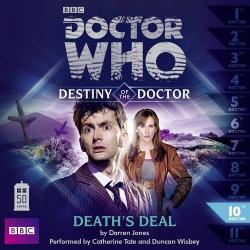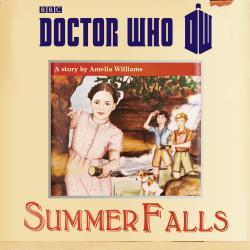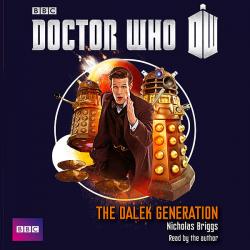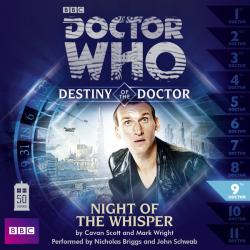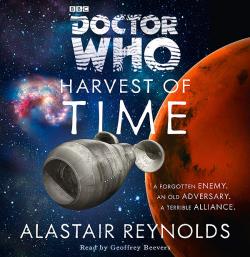Destiny of the Doctor: The Time Machine
Wednesday, 13 November 2013 - Reviewed by
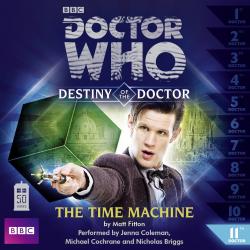
The Time Machine
Released by AudioGo
Produced by Big Finish
Written by Matt Fitton
Directed by John Ainsworth
Released: November 2013
To paraphrase David Tennant’s incarnation of the Doctor, doesn’t that just sum a potent series up? You get through all of the presents, and at the bottom of the pile, there’s a Satsuma. In the case of Destiny of the Doctor, the aforementioned spherical orange fruit mentioned in The Christmas Invasion symbolises a decent yet ultimately underwhelming conclusion to a franchise of audio adventures which could have resulted in so much more with the correct denouement. There’ve been weaker instalments than The Time Machine, but boy, have there been stronger chapters in the saga by a considerable distance.
This isn’t a release that’s for want of an accomplished narrator, however. Quite why Jenna Coleman’s on-screen companion Clara hasn’t been included in proceedings this time around is beyond this reviewer, for the standalone assistant Amy Watson comes off as little more than a stand-in here. If anything, Watson seems to have been named as such primarily on the basis of the literary implications of her surname, which naturally serves as the source for more than one gag based around the Great Detective himself. All the same, Coleman’s dictation is constantly engaging and efficiently brings across the rapid, blockbuster-esque pace of the narrative, even in spite of its negating to include the Impossible Girl at the Doctor’s side for the ride.
Joining the piece’s leading lady are Nicholas Briggs and Michael Cochrane, the former portraying the drama’s antagonists, the Creevix, and the latter taking on the role of Doctor Chivers. It took some time for this reviewer to discern to which alien race from the revived series of Who Briggs’ Creevix bore an uncanny resemblance, but in the end, The Power of Three’s Shakri commander appears to have had a significant influence. This familiar vocal adaptation certainly doesn’t work in the piece’s favour in terms of innovation, and that Cochrane’s performance echoes past whimsical professors aplenty isn’t beneficial in the long run either. Perhaps the series’ producers had scarce choice for vocal contributors to this final instalment- either way; it’s a crying tragedy that their selections pale so immensely in comparison to their predecessors on the run.
As the Destiny run has developed over the course of 2013, it became evermore apparent that its resolution of the ongoing arc of the Eleventh Doctor’s visits to his past selves would be paramount to the series’ success in hindsight. The approach which writer Matt Fitton takes in creating both a standalone narrative and a satisfying conclusion for long-term fans is admirable; although overall the resolution in question feels rather rushed and haphazard. Partly, that’s due to the threat of the tale hardly being dangerous enough to warrant such a dangerous timeline-crossing excursion for the incumbent incarnation. Moreso, though, this plot arc connection is only re-established in the drama’s closing moments and is dealt with just as swiftly as the Eleventh’s cameos came and went in previous chapters.
In the scheme of Doctor Who’s 50th Anniversary, it’s fair to argue that a great degree of threat is required so as to have a grand celebratory impact on the viewer, or in this case the listener. The Day of the Doctor has an evil, apparently lost incarnation of everyone’s favourite Time Lord and The Light at the End resumes the seemingly undying threat of the Master, yet The Time Machine’s antagonist is neither iconic nor particularly original. The Five Doctors’ Borusa may not have gone down in the history books, but at least that anniversary special had enough in the way of returning companions and foes to compensate. Devoid of classic adversaries or allies beyond a few references and throwbacks, this is a member of the 50th ensemble which is remarkably hollow when judged alongside its ambitious cohorts. AudioGo’s Destiny range hasn’t lacked ambition in the past, so this sudden subversion of followers’ expectations is a bitter shock, an inadvertent betrayal of our hopes for what could have been a truly noteworthy outing.
This is a disheartening end, then, to a range of audio dramas which showed so much promise throughout its run. Though there were most certainly sore notes, Vengeance of the Stones and Enemy Aliens among them, Destiny of the Doctor has had its fair share of highlights, Babblesphere and Death’s Deal the most noteworthy by far. The Time Machine lies somewhere in the middle of the spectrum, and while as a finale it’s a worthy listen for series veterans, as a standalone instalment of Doctor Who it stumbles and veers close to falling flat on its face. Coleman’s narration is superb, yet her supporting stars are steeped in the framework of what’s come before when it comes to their character performances, and Matt Fitton’s script struggles under the weight of the series’ convoluted plot arcs.
Big Finish and AudioGo’s first major collaboration has been something of a mixed bag, but for those fans still craving further 50th Anniversary homages and stories, the overall experience of hearing Destiny of the Doctor in full is accomplished enough to warrant an investment. Hunters of Earth kicks proceedings off with a bang, and the momentum of the overarching storyline rarely lapses from that point onwards. Each narrator does a fine job of representing their respective era of Doctor Who, as do each of the eleven intricate scripts. Just be warned, though, that its finale is undoubtedly the Satsuma of the pile.
